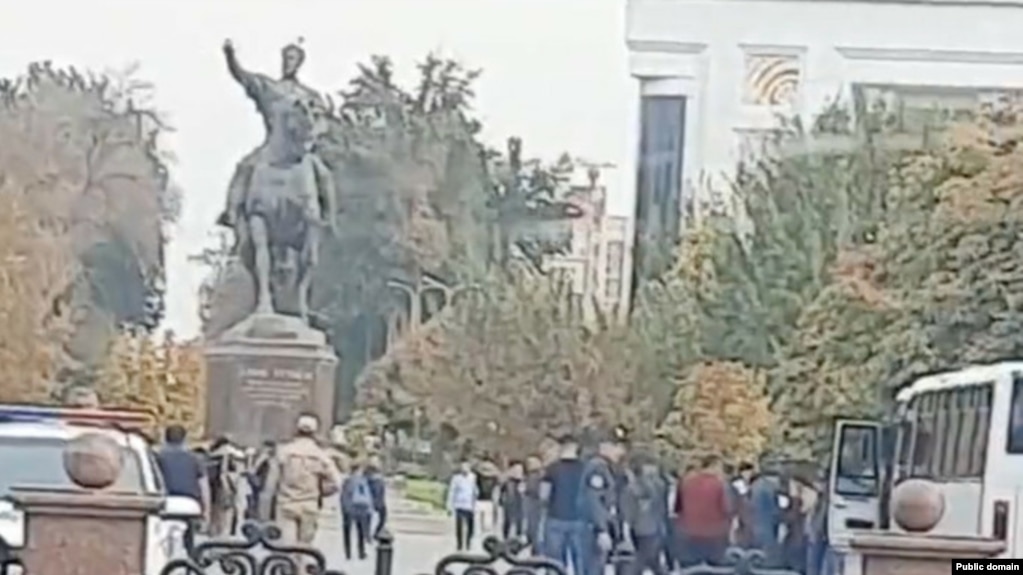Tashkent's (moderate) support for Hamas's war on Israel
In relation to Middle Eastern affairs, the climate in Uzbekistan is increasingly heavy. The authorities fear a resurgence of Islamic fundamentalism. In addition to bans on public expression, regulations restricting explicitly Islamic traditions are increasing: from clothes that cover women's faces to the family practices of arranged and polygamous marriages.
Moscow (AsiaNews) - Uzbekistan, like many countries in the world and especially those with an Islamic majority, is also taking the side of the Palestinians in the conflict with the Israelis. Faced with demonstrations by young people in recent days, however, the Tashkent authorities have decided to take a stand against excesses, to avoid disorders like those which occurred in the Russian Caucasian republic of Dagestan, with the anti-Semitic pogroms.
President Šavkat Mirziyoyev announced that he has allocated one and a half million dollars to help the inhabitants of the Gaza sector, under siege by Israel, entrusting them to the UN agency for the Middle East.
He expressed Uzbekistan's "full solidarity with the people of Palestine", supporting their right to form an independent state. At the same time he did not lack "compassion and condolences to all the families of the people who lost their lives, both on the Palestinian and Israeli side".
Mirziyoyev also wanted to warn Uzbek youth "not to be influenced by the many lies of propaganda" and "not to carry out actions contrary to the law". This statement resonated two days after the police had to disperse a demonstration in Tashkent in support of Palestine, stopping over one hundred demonstrators who intended to occupy the square in the center of the capital. The calls to meet had been spread via social networks, copying the banners of similar meetings underway in Istanbul.
The logo proposed by the Uzbek activists showed the face of Amir Timur (the Tamerlane), the Uzbek-Mongolian leader who also conquered the Holy Land, to whom the central space of the city is dedicated.
Around the monument dedicated to him, a crowd of people with the flags of Uzbekistan and Palestine and the writings "Shoulder to shoulder of the Palestinians" and "15 days in prison don't scare us" with reference to the punishment for unauthorized demonstrations, and also "If there are many of us, they will hear us!”.
However, in the square they found the police forces lined up, together with members of the OVD services and the National Guard, with buses ready to take those arrested to the control and detention posts.
The police held "clarification conversations" with the arrested people and most were released, but some received fines for "violation of public order rules and organization of unauthorized meetings or street demonstrations".
The reports have ended up in the courts for possible further consequences, and will have to be judged in different districts of Tashkent. Some were also held in cells for a few days.
On Uzbek social media, the punishment of the demonstrators sparked many protests, given that in fact the demonstration did not take place; a former member of Parliament, Rasul Kušerbaev, wrote that "people cannot be punished for crimes that have not even been committed", underlining that the order for street rallies is not spelled out in Uzbek legislation, but is only addressed in ministerial decrees limited in time. It was the then prime minister Šavkat Mirziyoyev, now president, who issued a circular in this regard in July 2014, concerning only demonstrations "against the authorities".
The climate in Uzbekistan is becoming increasingly difficult in relation to Middle Eastern events, and the authorities fear a resurgence of Islamic fundamentalism, already thwarted several times in the thirty post-Soviet period with various repressive measures. In addition to bans on public expression, the rules that limit traditions explicitly linked to the Muslim religion are increasing, from clothes that cover women's faces to family practices of arranged and polygamous marriages, so as not to transform the country into a new home of political fanaticism. religious.







.png)










